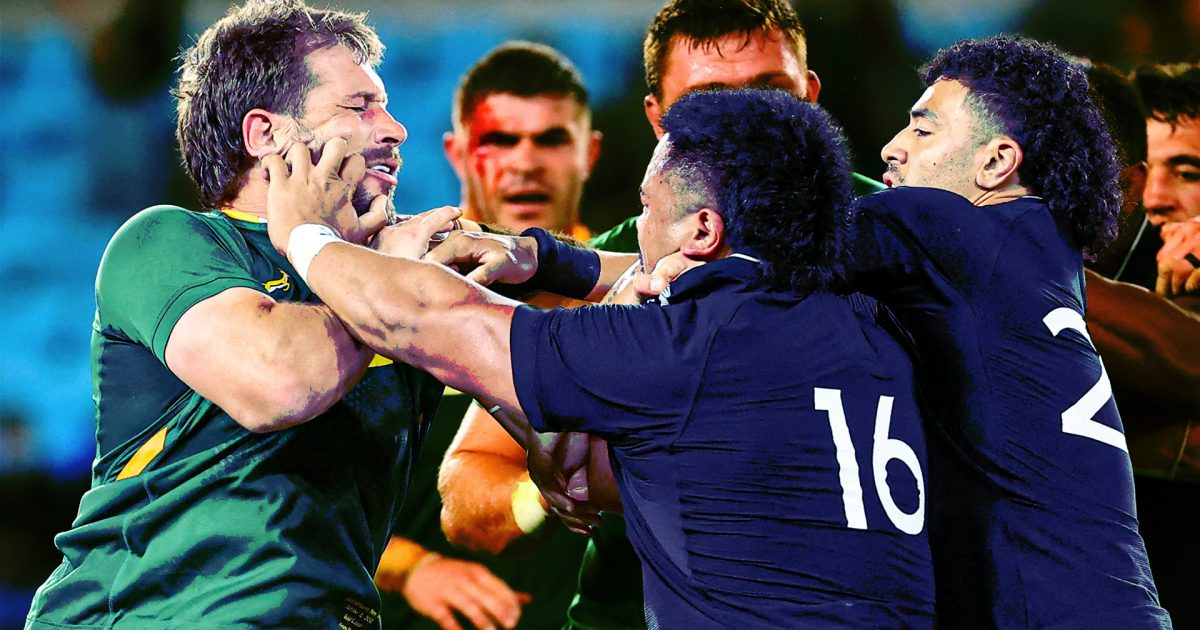The Springboks-All Blacks rivalry transcends the Rugby Championship

South Africa’s involvement with New Zealand and Australia long predates the existence of the Rugby Championship and whatever the future holds, the on-field battles between the Springboks, All Blacks and Wallabies will still hold pride of place in the rugby calendar.
There’s been an understandable outcry at rumours that South Africa could be set for a shock shift north to join the Six Nations as early as 2026, once their current broadcast arrangement comes to an end.
Although the Six Nations have publicly rejected the rumours, it’s impossible to rule out a shake-up of rugby’s premier annual international competition in the future.
While South Africa is geographically more than a few stone’s throws away from Europe, the time zones are better matched than with the likes of Australia and New Zealand and the bulk of the Springboks now play their club rugby in Europe, whether it’s for South African sides in the United Rugby Championship or for other teams in England, Ireland and France.
As such, it would make sense on many levels for the South African Rugby Union to fully commit to the north, instead of splitting their club and international rugby across the two hemispheres.
How that would work for the Six Nations is anyone’s guess.
While Italy has shown little improvement since their addition to the competition at the turn of the millennium, evicting the Azzurri from the tournament would represent a serious step backwards in the development of rugby outside of the traditional nations and only further the belief that the sport is only willing to open its doors to new competitors when the dollar symbols align.
The alternative model would simply see the Springboks added alongside the current Six Nations sides, increasing the competition’s length from five rounds to six and seven weeks to eight, including two ‘break’ weekends.
Whatever the case for the north, the permutations for the south are much more complex.
If the SARU were to break away, Australia, New Zealand and Argentina would have little choice but to welcome the likes of Japan and Fiji into a new Rugby Championship – something which many people believe is already long overdue.
At present, Australia and Argentina are barely a match for NZ, let alone Japan or any of the Pacific Island nations, but there’s hope that increased regular competition could help the developing nations catch up with their more established rivals. The introductions of Fijian Drua and Moana Pasifika to Super Rugby should also bear fruit, although that might not be until five years down the track.
Looking at it holistically, however, how big an impact would the Springboks’ shift to the Six Nations have on the annual calendar of a side like the All Blacks?
In a normal year where matches and schedules weren’t dictated by Covid – as many are hoping for in the 2022 test season – New Zealand would play 14 fixtures: six in the Rugby Championship, three in July and four in November. Just two of those games each year are against the Springboks.
In a scenario where the Springboks left the Rugby Championship, the All Blacks would still expect to take on their South African rivals at least once every season. If the Nations Championship concept comes to pass, an additional match or two would likely take place each year and if it doesn’t, two or three-game tours would be on the calendar once every World Cup cycle.
In short, the average number of games between the All Blacks and Springboks would remain relatively constant.
The rivalry between NZ and South Africa kicked off in 1921 at Carisbrook in Dunedin and it has arguably developed into the fiercest in world rugby, with no love lost on the pitch but plenty of respect built off it.
Said rivalry was in full flight well before the advent of the Tri-Nations in 1996 – despite the fact that the clashes weren’t always annual events. Test series between the All Blacks and Springboks were often separated by half a decade or more and the lack of regular fixtures didn’t harm the competition in any way, shape or form. As such, even if the Springboks were to head north and even if the number of games between them and the All Blacks were to fall, the rivalry would never lose its lustre.
South Africa’s potentially inevitable realignment in the game could be the one major shake-up that actually opens up greater fluidity between the tier-one nations and every other side in the world. Little real assistance was given to Japan to boost their standing but as soon as they found their feet and knocked off a few of the traditional teams at the World Cup, every man and their dog was lining up to play matches in the Land of the Rising Sun and supposedly both the Six Nations and the Rugby Championship were interested in bring the Brave Blossoms into their respective tournaments.
If the Springboks defect, NZ and Australia would be forced to build a premier international product with teams that have been tapping on the window for a while but never really managed to get their foot in the door and it could be the best thing for the long-term growth of the game.
Developing sides would join the top table while precious games between the All Blacks and the Springboks wouldn’t be lost to the nether, they’d simply be elevated to the almost mythic standing they once had on the world calendar.




















































